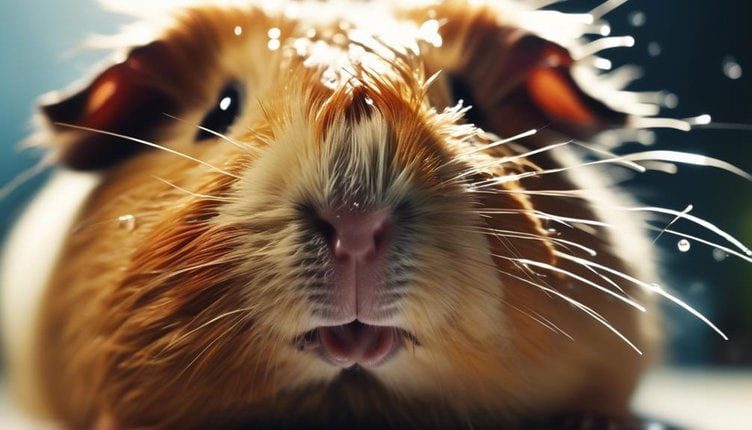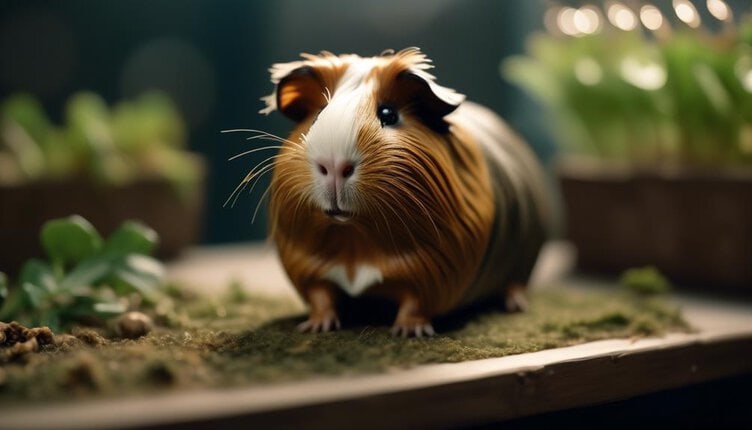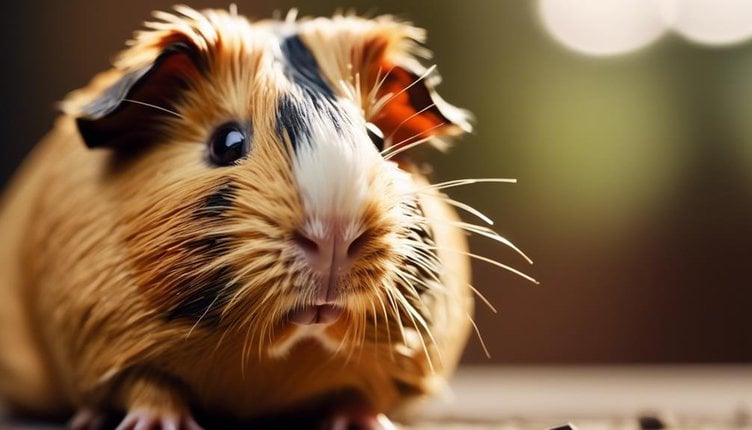Attention guinea pig enthusiasts!
Picture this: a tiny cough, seemingly harmless, but beneath the surface lies a respiratory system struggling for air. Yes, just like us, these adorable creatures can fall victim to the dreaded pneumonia.
However, identifying the symptoms of this potentially fatal condition can be quite the challenge, even for the most attentive caretakers. We're talking persistent coughing, nasal discharge, and crusty eyes – signs that often go unnoticed until it's too late.
Today, we're diving deep into the subtle cues that guinea pigs may display when battling pneumonia, shedding light on how to detect this illness early on and promptly seek top-notch veterinary care. But fair warning, my friends, the untrained eye may dismiss these symptoms as mere quirks, leaving you to wonder if your precious guinea pig is truly in harm's way.
Stay tuned for some eye-opening information!
Key Takeaways
- Maintaining a clean and hygienic living environment is crucial in preventing pneumonia in guinea pigs.
- Proper nutrition, ventilation, and avoiding exposure to extreme temperatures also help prevent pneumonia in guinea pigs.
- Prompt veterinary attention is necessary for accurate diagnosis and appropriate treatment of pneumonia in guinea pigs.
- Regular check-ups and consultations with a veterinarian are important for maintaining the health of guinea pigs.
Difficulty Breathing
Difficulty breathing is a common symptom of guinea pig pneumonia that should be promptly recognized and addressed. Guinea pigs are prone to respiratory infections, and pneumonia is one of the most serious conditions they can develop. When a guinea pig is experiencing difficulty breathing, it's crucial to seek immediate veterinary attention.
Treatment options for guinea pig pneumonia include antibiotics, nebulization therapy, and supportive care. Antibiotics, such as enrofloxacin or trimethoprim-sulfamethoxazole, are commonly prescribed to combat the bacterial infection causing the pneumonia. Nebulization therapy helps to moisten the airways and alleviate respiratory distress. Additionally, providing supportive care, such as keeping the guinea pig warm and hydrated, can aid in their recovery.
Prevention measures play a crucial role in reducing the risk of guinea pig pneumonia. Maintaining a clean and hygienic living environment is essential, as it helps minimize the exposure to bacteria and other pathogens. Regularly cleaning the cage, providing fresh bedding, and ensuring good ventilation can help prevent respiratory infections. It's also important to handle guinea pigs with clean hands and avoid exposing them to sick or infected animals. Proper nutrition and a healthy diet can boost the immune system, making the guinea pig less susceptible to infections.
Persistent Coughing
Does your guinea pig have a persistent cough? If so, it could be a sign of respiratory distress, which is a common symptom of pneumonia in guinea pigs. Pneumonia is a serious condition that can be life-threatening if left untreated. It's important to recognize the symptoms early on and seek veterinary care to ensure the well-being of your furry friend.
Persistent coughing is often one of the first signs of respiratory distress in guinea pigs. The cough may be dry or accompanied by wheezing or labored breathing. Guinea pigs with pneumonia may also show signs of lethargy, loss of appetite, weight loss, and a decrease in activity level. If you notice these symptoms in your guinea pig, it's crucial to consult a veterinarian as soon as possible.
Respiratory distress in guinea pigs can be caused by various factors, including bacterial or viral infections, allergies, or environmental factors such as poor ventilation or exposure to irritants. Prompt diagnosis and treatment are essential to prevent further complications and aid in the recovery process.
To prevent respiratory problems in guinea pigs, it's important to provide a clean and well-ventilated living environment. Avoid exposure to smoke, strong odors, and dusty bedding materials. Regular veterinary check-ups and a balanced diet can also contribute to maintaining a healthy immune system.
Frequent Sneezing

Frequent sneezing in guinea pigs can be an indication of respiratory issues such as pneumonia. It's important for guinea pig owners to pay attention to this symptom as it could be a sign of a more serious underlying condition.
Alongside frequent sneezing, other symptoms to look out for include squeaky breathing and watery or crusty eyes, which may warrant a visit to the veterinarian for a proper diagnosis and treatment.
Squeaky Breathing
Sneezing and experiencing squeaky breathing are common indicators of possible pneumonia in guinea pigs. If your furry friend is exhibiting these symptoms, it's important to take action promptly. Here are a few key points to consider when dealing with squeaky breathing in guinea pigs:
- Preventing squeaky breathing in guinea pigs:
- Ensure proper ventilation in their enclosure.
- Keep their living space clean and free from dust and pollutants.
- Avoid exposing them to extreme temperatures.
- Provide a balanced diet and maintain their overall health.
When it comes to treatment options for squeaky breathing in guinea pigs, it's crucial to consult a veterinarian. They may recommend the following:
- Treatment options for squeaky breathing in guinea pigs:
- Antibiotics to combat bacterial infections.
- Respiratory support, such as nebulization or oxygen therapy.
- Anti-inflammatory medications to reduce inflammation in the airways.
- Regular check-ups to monitor progress and adjust treatment if necessary.
Watery or Crusty Eyes
If your guinea pig is experiencing squeaky breathing, it's important to also be vigilant for signs of watery or crusty eyes. Watery or crusty eyes can be indicators of pneumonia in guinea pigs, along with frequent sneezing. These symptoms may be caused by an infection in the respiratory system, which can lead to complications if left untreated.
To prevent pneumonia, it's crucial to maintain proper hygiene, provide a clean and well-ventilated living environment, and avoid exposure to drafts or extreme temperatures.
If your guinea pig develops watery or crusty eyes, it's essential to seek veterinary care for an accurate diagnosis and appropriate treatment options. Your veterinarian may prescribe antibiotics or other medications to address the underlying infection. Additionally, home remedies such as warm compresses can be used to provide relief and promote healing.
Loss of Appetite
Loss of appetite is a common symptom observed in guinea pigs with pneumonia. When a guinea pig is suffering from pneumonia, their respiratory system is compromised, which can lead to a loss of interest in food. It's crucial to address this issue promptly, as a decrease in appetite can result in malnutrition and further health complications.
Here are some possible discussion ideas about loss of appetite in guinea pigs:
- Nutritional strategies to encourage appetite in guinea pigs:
- Offer a variety of fresh vegetables and fruits to entice the guinea pig to eat.
- Provide high-quality hay to ensure a balanced diet and promote digestion.
- Offer small, frequent meals throughout the day to prevent overwhelming the guinea pig's digestive system.
- Consider supplementing with vitamin C, as guinea pigs can't produce this essential nutrient on their own.
- Identifying and addressing underlying causes of appetite loss in guinea pigs:
- Rule out any dental issues that may be causing pain while eating.
- Check for signs of gastrointestinal problems, such as diarrhea or bloating, that could be affecting the guinea pig's appetite.
- Assess the guinea pig's environment for stressors, such as loud noises or frequent disturbances, that may be contributing to their loss of appetite.
- Consult with a veterinarian to rule out any other underlying health conditions that could be causing the appetite loss.
Weight Loss

Weight loss is a common symptom of guinea pig pneumonia. When a guinea pig is sick, it may experience a decreased appetite, leading to weight loss. In addition, lethargy and weakness can contribute to further weight loss.
It's important for guinea pig owners to monitor their pets' weight and consult a veterinarian if they notice significant weight loss.
Decreased Appetite
A guinea pig experiencing a decrease in appetite may be a sign of potential health issues. It's important for guinea pig owners to monitor their pet's eating habits closely, as a decreased appetite can indicate various underlying problems.
Here are a few key points to consider:
- Nutritional imbalances: A decreased appetite may be a result of an improper guinea pig diet, lacking essential nutrients.
- Dental issues: Guinea pigs have continuously growing teeth, and dental problems can lead to pain while eating, causing a decreased appetite.
- Gastrointestinal disorders: Conditions like gastrointestinal stasis or diarrhea can cause discomfort and lead to a loss of interest in food.
- Respiratory infections: Pneumonia, as discussed in the previous subtopic, can also contribute to a decreased appetite due to the associated lethargy and difficulty breathing.
If a guinea pig exhibits a decreased appetite, it's crucial to consult a veterinarian to determine the underlying cause and provide appropriate treatment.
Lethargy and Weakness
Lethargy and weakness can be indicative of underlying health issues in guinea pigs, requiring immediate attention from a veterinarian. These symptoms can have a significant impact on a guinea pig's overall health and should not be ignored. When a guinea pig is lethargic and weak, it may struggle to perform normal activities and show a lack of interest in its surroundings. This can lead to weight loss, as the guinea pig may not have the energy or motivation to eat. It is important to identify the cause of lethargy and weakness in guinea pigs and provide appropriate treatment. Some treatment options for lethargy in guinea pigs include providing a balanced diet, ensuring proper hydration, and administering any necessary medications. It is crucial to consult a veterinarian to determine the underlying cause and develop a suitable treatment plan for the affected guinea pig.
| Treatment Options for Lethargy in Guinea Pigs | |
| – Provide a balanced diet | |
| – Ensure proper hydration | |
| – Administer necessary medications |
Lethargy and Decreased Activity
The guinea pig may exhibit decreased activity and a lack of energy, indicating the presence of lethargy, which can be a symptom of pneumonia. When a guinea pig becomes lethargic, it's important to take notice, as it could be a sign of an underlying health issue. Pneumonia, a common respiratory infection in guinea pigs, can lead to a decrease in energy levels and a lack of enthusiasm. It's crucial to recognize these symptoms early on to ensure prompt treatment and a speedy recovery for the beloved pet.
Here are some key points to consider regarding lethargy and decreased activity in guinea pigs with pneumonia:
- Loss of appetite: Guinea pigs with pneumonia may show a decreased interest in food and water. This can lead to weight loss and further weaken the already compromised immune system.
- Hiding and isolation: Sick guinea pigs often seek solitude and may hide away in their enclosure or refuse social interaction. This behavior change can be attributed to their decreased energy levels and overall feeling of unwellness.
- Reduced grooming: Pneumonia can cause guinea pigs to neglect their grooming routine. Their fur may appear unkempt, and they may have difficulty cleaning themselves, indicating a lack of energy and discomfort.
- Sluggish movements: Lethargic guinea pigs may move slowly or exhibit a lack of enthusiasm when engaging in activities that were previously enjoyable. Their movements may be less frequent and less energetic.
If a guinea pig displays any of these symptoms, it's crucial to consult a veterinarian promptly. Early detection and treatment can significantly improve the chances of a full recovery and a return to their active and cheerful selves.
Nasal Discharge and Crusty Eyes

Decreased activity and lethargy are often accompanied by nasal discharge and crusty eyes in guinea pigs with pneumonia. Nasal discharge, also known as rhinorrhea, is a common symptom in guinea pigs with respiratory infections such as pneumonia. The discharge may be clear, cloudy, or even tinged with blood. It can be caused by the inflammation of the nasal passages, which leads to an increased production of mucus. In some cases, bacterial or viral infections can also contribute to the nasal discharge.
To treat nasal discharge in guinea pigs, it's important to address the underlying cause, which is typically pneumonia in this case. The primary goal is to eliminate the infection and reduce the inflammation. This often involves a combination of antibiotics, anti-inflammatory medications, and supportive care. It's crucial to consult a veterinarian for a proper diagnosis and treatment plan.
Crusty eyes, also known as conjunctivitis, can also be a result of respiratory infections in guinea pigs. The inflammation in the nasal passages can spread to the eyes, causing redness, discharge, and crusting. To prevent and care for crusty eyes in guinea pigs, it's important to maintain good hygiene. Keeping the guinea pig's living environment clean and providing proper ventilation can help prevent respiratory infections. If crusty eyes occur, gently clean the area with a warm, damp cloth and consult a veterinarian for further guidance.
Frequently Asked Questions
Can Pneumonia in Guinea Pigs Be Transmitted to Humans?
Pneumonia in guinea pigs can be transmitted to humans, although it is rare. It is important to take precautions when handling guinea pigs with pneumonia to minimize the risk of transmission.
Is There a Cure for Pneumonia in Guinea Pigs?
There is no known cure for pneumonia in guinea pigs, but there are treatment options available. It is important to consult a veterinarian for proper diagnosis and guidance on how to manage and alleviate the symptoms.
How Long Does It Take for a Guinea Pig to Recover From Pneumonia?
The recovery time for a guinea pig with pneumonia can vary depending on the severity of the infection and the effectiveness of treatment options. It is important to consult a veterinarian for proper diagnosis and guidance.
Can Pneumonia in Guinea Pigs Be Prevented?
Preventing pneumonia in guinea pigs is possible by addressing common causes like poor ventilation and stress. Regular cleaning of their living environment and ensuring a balanced diet can greatly reduce the risk.
Can Guinea Pigs With Pneumonia Still Be Kept With Other Guinea Pigs?
Guinea pigs with pneumonia should be quarantined to prevent spreading the infection to other guinea pigs. Treating pneumonia in guinea pigs requires veterinary care and medications, along with proper hygiene and care.





